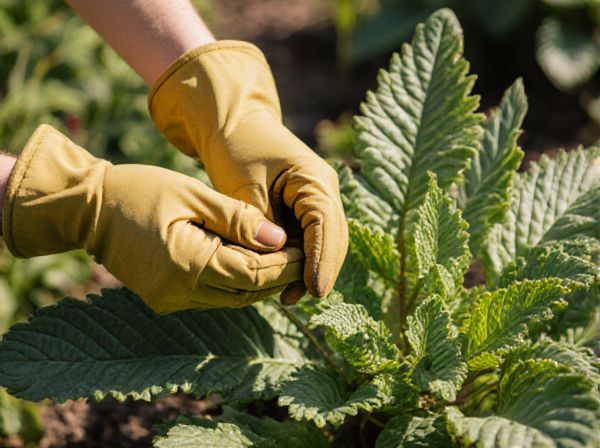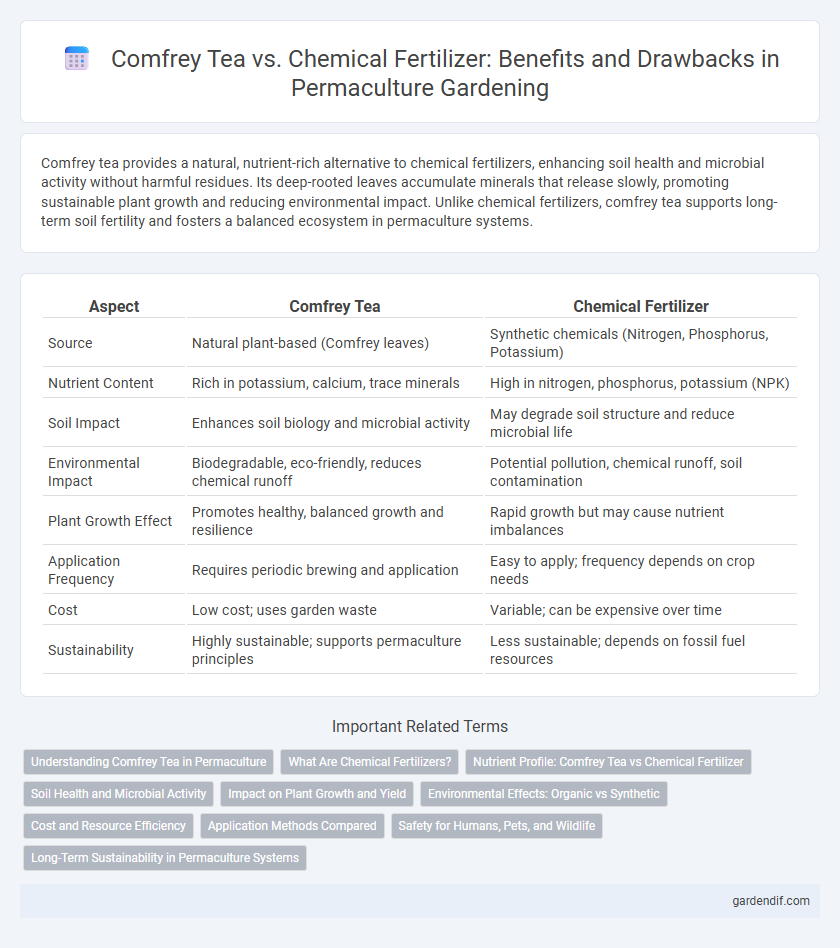
Comfrey tea vs chemical fertilizer Illustration
Comfrey tea provides a natural, nutrient-rich alternative to chemical fertilizers, enhancing soil health and microbial activity without harmful residues. Its deep-rooted leaves accumulate minerals that release slowly, promoting sustainable plant growth and reducing environmental impact. Unlike chemical fertilizers, comfrey tea supports long-term soil fertility and fosters a balanced ecosystem in permaculture systems.
Table of Comparison
| Aspect | Comfrey Tea | Chemical Fertilizer |
|---|---|---|
| Source | Natural plant-based (Comfrey leaves) | Synthetic chemicals (Nitrogen, Phosphorus, Potassium) |
| Nutrient Content | Rich in potassium, calcium, trace minerals | High in nitrogen, phosphorus, potassium (NPK) |
| Soil Impact | Enhances soil biology and microbial activity | May degrade soil structure and reduce microbial life |
| Environmental Impact | Biodegradable, eco-friendly, reduces chemical runoff | Potential pollution, chemical runoff, soil contamination |
| Plant Growth Effect | Promotes healthy, balanced growth and resilience | Rapid growth but may cause nutrient imbalances |
| Application Frequency | Requires periodic brewing and application | Easy to apply; frequency depends on crop needs |
| Cost | Low cost; uses garden waste | Variable; can be expensive over time |
| Sustainability | Highly sustainable; supports permaculture principles | Less sustainable; depends on fossil fuel resources |
Understanding Comfrey Tea in Permaculture
Comfrey tea, made by steeping comfrey leaves in water, provides a nutrient-rich, organic fertilizer abundant in potassium, nitrogen, and phosphorus essential for plant growth in permaculture systems. Unlike chemical fertilizers that often contain synthetic compounds and can disrupt soil microbiology, comfrey tea enhances soil health by promoting beneficial microbial activity and improving soil structure. This natural nutrient boost supports sustainable, eco-friendly gardening practices by reducing reliance on chemical inputs while fostering robust plant development.
What Are Chemical Fertilizers?
Chemical fertilizers are synthetic compounds engineered to supply specific amounts of essential nutrients like nitrogen, phosphorus, and potassium to plants, often enhancing growth rapidly but sometimes causing soil degradation and nutrient imbalance. Comfrey tea, derived from fermented comfrey leaves, offers a natural, slow-release source of nutrients and beneficial microbes that improve soil health and plant resilience without the environmental risks linked to chemical fertilizers. Using comfrey tea supports sustainable permaculture practices by fostering long-term soil fertility and reducing dependency on synthetic inputs.
Nutrient Profile: Comfrey Tea vs Chemical Fertilizer
Comfrey tea provides a rich, natural nutrient profile high in potassium, calcium, and trace minerals essential for plant growth, enhancing soil health and microbial activity. Chemical fertilizers typically contain concentrated amounts of nitrogen, phosphorus, and potassium but often lack micronutrients and can disrupt soil ecosystems. Using comfrey tea promotes sustainable nutrient cycling and long-term soil fertility, contrasting with the quick-release but potentially harmful effects of synthetic fertilizers.
Soil Health and Microbial Activity
Comfrey tea enhances soil health by providing a rich blend of nutrients and organic compounds that stimulate microbial activity, promoting beneficial bacteria and fungi essential for nutrient cycling. In contrast, chemical fertilizers often disrupt soil microbial communities by introducing synthetic compounds that can reduce microbial diversity and soil structure over time. Using comfrey tea supports sustainable soil ecosystems, improving long-term fertility and resilience in permaculture systems.
Impact on Plant Growth and Yield
Comfrey tea enhances plant growth and yield by providing a rich source of nitrogen, potassium, and phosphorus in a natural, slow-release form that improves soil fertility and microbial activity. Unlike chemical fertilizers, comfrey tea minimizes the risk of nutrient burn and supports sustainable soil health, leading to stronger root development and higher-quality crops over time. Studies show that plants fed with comfrey tea often exhibit increased biomass and improved resilience compared to those treated with synthetic fertilizers.
Environmental Effects: Organic vs Synthetic
Comfrey tea, rich in potassium, calcium, and nitrogen, provides a balanced, slow-release nutrient source that enhances soil structure and microbial activity without leaching harmful chemicals into waterways. Chemical fertilizers, while delivering immediate nutrient boosts, often contribute to soil degradation, nutrient runoff, and water pollution due to their synthetic compounds and high solubility. Using comfrey tea supports sustainable soil health and biodiversity, reducing environmental impact compared to synthetic fertilizers commonly associated with ecosystem disruption.
Cost and Resource Efficiency
Comfrey tea offers a cost-effective and sustainable alternative to chemical fertilizers by utilizing readily available plant materials, significantly reducing the need for purchased inputs. Its nutrient-rich composition, especially high potassium and nitrogen levels, supports soil health and plant growth without the environmental costs associated with synthetic chemicals. Employing comfrey tea enhances resource efficiency by recycling on-site biomass, minimizing waste, and lowering overall gardening expenses.
Application Methods Compared
Comfrey tea delivers nutrients through foliar feeding and soil drenching, promoting gradual nutrient absorption and improved microbial activity. Chemical fertilizers apply nutrients directly to the soil in soluble forms, resulting in rapid but sometimes short-lived nutrient availability. Comfrey tea's organic compounds enhance soil health and plant resilience, while chemical fertilizers may risk nutrient leaching and soil degradation with repeated use.
Safety for Humans, Pets, and Wildlife
Comfrey tea offers a natural, non-toxic alternative to chemical fertilizers, minimizing risks to humans, pets, and wildlife by avoiding harmful synthetic chemicals and heavy metals often found in commercial products. It enriches soil with essential nutrients while promoting a safer garden environment free from chemical residues that can cause poisoning or ecological imbalance. Using comfrey tea supports sustainable permaculture practices by protecting beneficial organisms and maintaining biodiversity.
Long-Term Sustainability in Permaculture Systems
Comfrey tea enhances soil fertility naturally by providing a slow-release source of nutrients, improving microbial activity, and boosting plant health without the harmful residues associated with chemical fertilizers. Unlike synthetic fertilizers, which can degrade soil structure and reduce biodiversity over time, comfrey tea supports long-term soil regeneration and ecosystem balance in permaculture systems. This sustainable approach minimizes environmental impact and fosters resilient, self-sustaining gardens.
Comfrey tea vs chemical fertilizer Infographic

 gardendif.com
gardendif.com